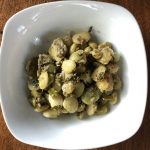Almost anyone who enjoys dining out has a whole range of places they enjoy, from fast food chains to casual stand-alone restaurants to (if cash flow permits), the occasional splurge at a high-end fine dining establishment. If you’re a reasonable person, your expectations of what gets brought into each restaurant pre-made, versus what’s made from scratch, should be on a sliding scale. No one could realistically expect that their favorite dive bar has a minimum wage cook in the back making veal demiglace in that tiny kitchen to pour onto an open-faced roast beef sandwich that sells for $8.99.
Most restaurant chefs use at least some pre-made products. Of the ones that do, the good ones gussy them up with sauces they make themselves, or church them up with additional ingredients to make them better.
Truly upper-echelon fine dining places make nearly everything by hand from start to finish. The cooks who work there make their own stock, roasting bones and simmering them with mirepoix (carrots, onions and celery) and herbs until the liquid is rich enough to strain and cool, after which it becomes nearly gelid. The result is something that can be used a dozen different ways, to make soups, sauces, and braising liquids. (Funny story: I once asked a couple of culinary students to strain a gorgeous stock that had taken most of two days to make, and they did. Right down the drain of the sink, leaving behind only the stuff you’re supposed to discard – used bones, limp herbs and vegetable mush.)
The chefs who run these places either hand-pick their own produce at farmer’s markets or off the back of actual farmers’ trucks that pull in behind the restaurant with this week’s haul. They might, however, purchase their bread from a rock-star bakery that delivers excellent products, proficiently executed with consistent quality. And that’s fine! As long as they don’t claim to be making it themselves.
But diners can’t always know a menu item is “house-made” simply because it says so in the menu description. To the unscrupulous menu writer, “house-made” could justifiably mean “We heated it up here in the microwave. Right here, in house.”
Experienced diners may not care whether a dish is house-made or not, depending on its price point. But nobody likes to be lied to. Is your “house-made” burger exactly, perfectly circular? No rough edges at all? Seasoned well but mushy in texture? It was probably brought in frozen, already formed into patties. Is your “house-made tortellini” sheer visual perfection, every single one completely uniform? Not unless that plate of five tortellini cost upwards of $28 and they have their own pasta expert in the back, slaving away morning, noon and night. (Some places do, though, and if you ever have actual fresh made pasta, you’ll be able to tell the difference).
If you’re at Denny’s and the biscuits are just a little too exactly all looking like clones and the gravy’s a little floury? Eh, who cares. But then Denny’s isn’t putting “house-made” in its menu descriptions. And they have photos on the menu!
Not long ago my long-suffering fiancé and I were at a solidly blue-collar establishment and I was pleasantly surprised by the mashed potatoes on my plate. “They made these here, themselves!” I said. He asked me how I knew. I told him it was because there were a few lumps in them and the redskin potato skins were still in, and they weren’t overcooked, mushy or grainy, as they would have been had they come frozen from a bag or reconstituted from dried.
Now, believe me, a high-end restaurant wouldn’t have lumps in their potatoes either because they would have taken the care to put them through a food mill or a a potato ricer (cool utensil, everyone should own one at home), but this wasn’t the kind of place that would pay someone to take the time to rice as many potatoes for mash that they were slinging. And a fancy place would call the side “potato puree” anyway. Nope, this was just the result of a practiced cook cooking potatoes until they were perfectly done but not overdone, adding milk, butter, salt and pepper and going to work with a hand-held potato masher like my grandma did.
I wanted to take my Sharpie to every menu in the place and write “HOUSE MADE” in front of the words “Mashed Potatoes” on each one.
Marsha Lynch has worked at many Louisville independent restaurants including Limestone, Jack Fry’s, Jarfi’s, L&N Wine Bar and Bistro, Café Lou Lou, Marketplace @ Theater Square, Fontleroy’s and Harvest.



